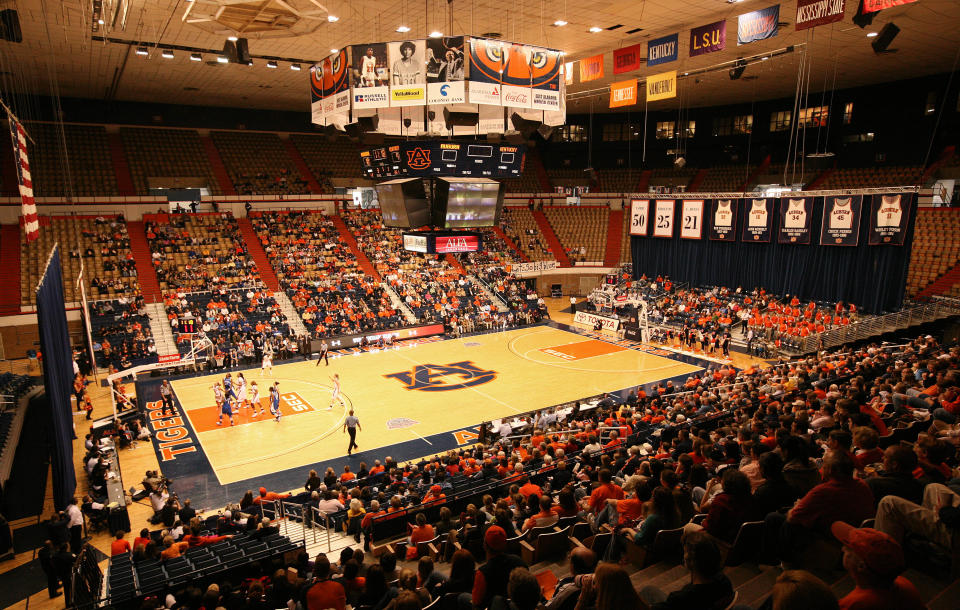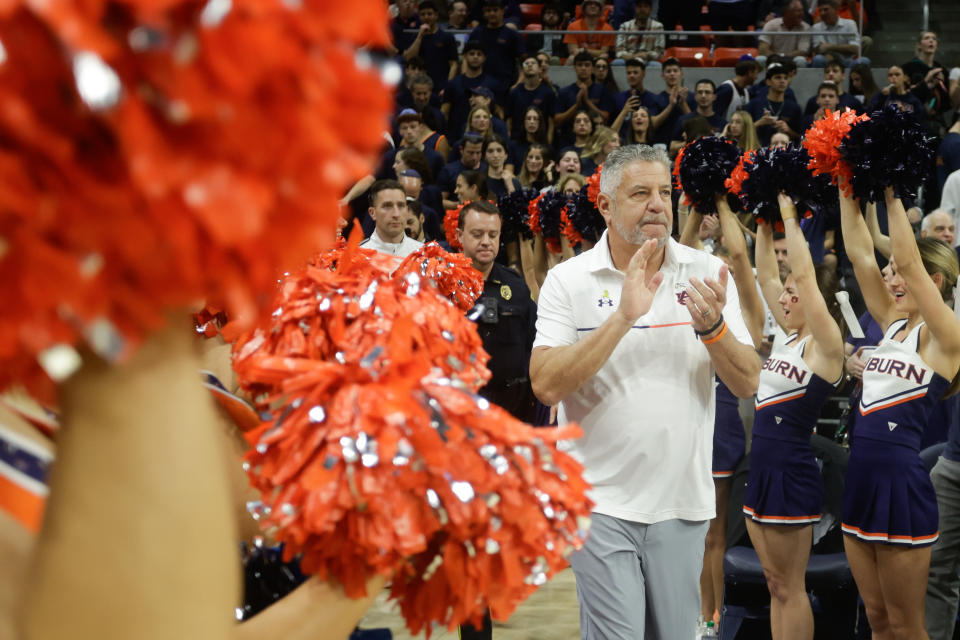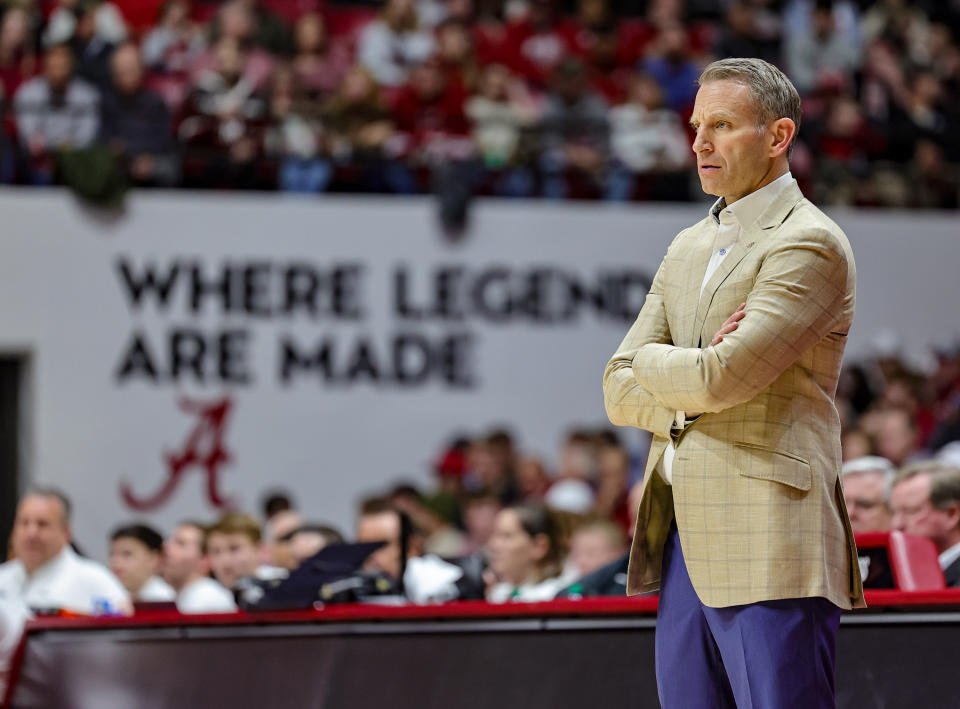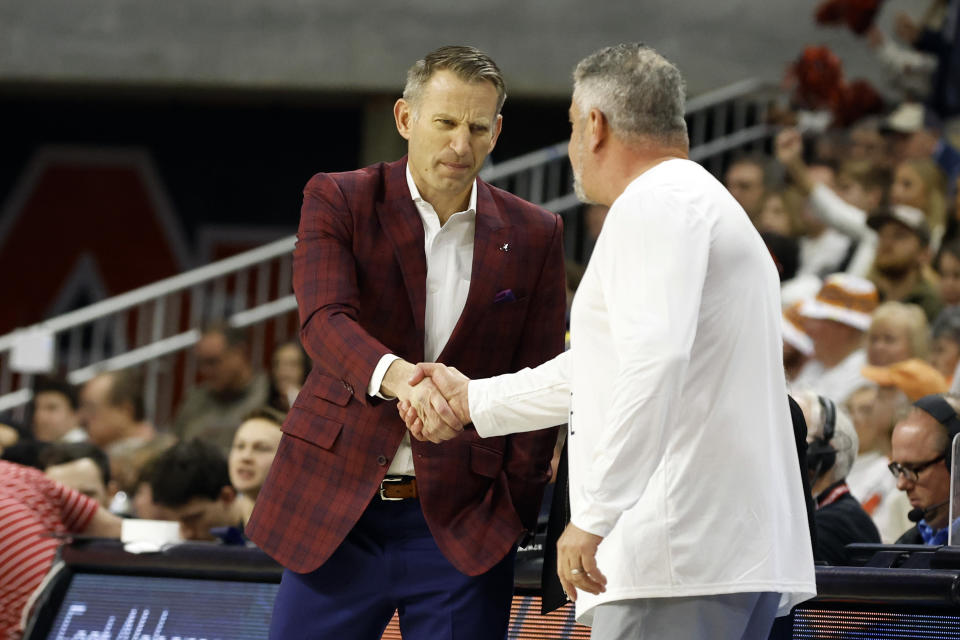The epicenter of college basketball this weekend won’t be Storrs, Connecticut, Lawrence, Kansas, or somewhere on Tobacco Road.
All eyes will be on a pigskin-obsessed state long synonymous with football.
Auburn and Alabama clash Saturday afternoon in Tuscaloosa in by far the most anticipated game in the history of their century-old men’s basketball rivalry. The Tigers (22-2, 10-1) enter atop the AP Top 25 and the Crimson Tide (21-3, 10-1) pace the coaches poll, a scenario that would have read like sci-fi fantasy as recently as a decade ago.
To put into perspective how rare this is, consider that this will be the first-ever top-two men’s basketball matchup in SEC history. Alabama and Auburn had only both met as ranked teams three times before the arrival of Nate Oats and Bruce Pearl injected newfound national relevance into a rivalry that previously had been about in-state bragging rights.
Saturday’s matchup shifts attention away from both schools’ dismal showings on the gridiron this year. Without newly retired Nick Saban, Alabama staggered its way through a lackluster four-loss season and missed the inaugural 12-team College Football Playoff. Auburn finished below .500 for the fourth consecutive year and sank further into mediocrity.
Meanwhile, both basketball programs have very real national title hopes, as the growing buzz for this season’s first of two regular-season matchups reflects. Tickets to Saturday’s game have been sold out for months. As of Friday morning, the secondary-market get-in price was $340 on StubHub and $319 on SeatGeek. Seats in Coleman Coliseum’s lower bowl are going for two or three times that much.
Alabama athletic director Greg Byrne has held his current job for eight years, meaning he has been in Tuscaloosa for some of the most memorable football games of the Saban era. He told Yahoo Sports that in his Alabama tenure, Saturday’s Iron Bowl of Basketball “is the most ticket requests I’ve ever had.”
“And that includes football,” Byrne emphasized. “There’s a level of anticipation for this game that is off the charts.”
From 2008 to 2017, Alabama and Auburn played 20 consecutive games in which neither team was ranked in the AP Top 25. Among those was Auburn’s infamous 49-37 victory in 2013, a game in which Tony Barbee’s Tigers only scored 13 points in the first half and Anthony Grant’s Tide answered by putting up only 14 after halftime.
How did we get from that to this? It’s a story no one could have seen coming.

How Auburn basketball became more than a diversion
The rebirth of Auburn men’s basketball began almost two decades ago with a meeting inside university president Ed Richardson’s wood-paneled office.
Auburn coach Jeff Lebo asked to speak with Richardson to reiterate his program’s need for the practice facility he had long been promised.
In those days, Auburn epitomized the SEC’s indifference to men’s basketball. The Tigers were a perennial afterthought, save for the Charles Barkley-Chuck Person era in the mid-1980s and one or two other brief spurts of relevance. Only twice since 1960 had they finished a season in the AP Top 25. Only once had they advanced as far as the NCAA tournament’s Elite Eight.
The most glaring proof of Auburn’s neglect was the aging multipurpose facility where the Tigers men’s and women’s basketball teams practiced and played. Lebo purposefully avoided showing Beard-Eaves Memorial Coliseum to prospective recruits because of its cavernous size, dim lighting and outdated locker room and weight room.
Since the Coliseum was home to anything from concerts, to graduation ceremonies, to practices and games for an assortment of other Auburn teams, the men’s basketball program frequently couldn’t practice on its own court. Lebo’s team was often relegated to a cramped, inadequately ventilated auxiliary gym not-so-affectionately known as the “Hot Box.”
“We did a study and it would happen 20 times a year during the basketball season and more during the offseason,” former Auburn athletic director Jay Jacobs told Yahoo Sports. “It was a disadvantage, but people didn’t recognize it at the time because many other schools in the SEC were in the same situation.”
This was some of the evidence that Lebo cited in January 2006 when advocating to renovate the Coliseum to include a new practice space for the men’s and women’s basketball teams. Lebo didn’t even get through his whole pitch inside Richardson’s office before influential Auburn booster and trustee Bobby Lowder interrupted.
“You can only put so much lipstick on a pig,” Jacobs remembers Lowder saying. Then Lowder proposed an even grander construction project: An intimate new basketball arena that would demonstrate Auburn’s commitment to being competitive in basketball and provide the Tigers a true home-court advantage.
“We don’t have the revenue in athletics to build a new facility,” Jacobs warned.
Lowder and Richardson assured Jacobs that they’d find a way to finance it.
The $92.5 million basketball arena was a high-risk investment at a football-focused school with a history of empty seats and losing seasons. As one dubious Auburn grad wrote in February 2010, nearly $100 million was a lot to spend “for a sport that’s nothing more than a diversion between the end of bowl season and spring football practice.”
Skepticism mounted as Auburn struggled to cobble together a competitive team in time for the unveiling of its new 10,000-seat facility. Jacobs fired Lebo months before the unveiling of the new arena after six seasons without an NCAA tournament bid. Newly hired Tony Barbee then christened the venue with consecutive dismal losses to UNC Asheville, Samford and Campbell, a harbinger of what lay ahead during his four straight sub-.500 seasons.
On the opening day of the 2014 SEC tournament, hours before Barbee’s Tigers crashed out in the 12-13 game, then-SEC commissioner Mike Slive gathered the league’s athletic directors and challenged them to invest in men’s basketball. Slive felt the SEC was capable of far more than a second straight year of receiving only three NCAA tournament bids.
“Commissioner Slive’s words stuck with me,” Jacobs recalled. “I sort of felt like he was shining a light on me even though there were other people in the room whose basketball program was in no better shape than ours was.”
That night, Jacobs dismissed Barbee at the team hotel in Atlanta, a move he planned to make all along. Then, with Slive’s words fresh in his memory, he made a list of the qualities he valued most in his next coach. He wanted someone who had achieved sustained success in a power conference, someone who was unfazed by a rebuilding project, someone who could energize an apathetic fan base and have a presence in the community.
He wanted Bruce Pearl.

Bruce Pearl to the rescue
Two days later, Jacobs and right-hand man David Benedict traveled to Connecticut to meet with Pearl at a Bristol hotel.
Pearl by then was three years removed from losing his job at Tennessee for lying to NCAA investigators in an attempt to cover up minor recruiting violations. He was doing studio analysis for ESPN and working a corporate job for a grocery distributor while completing the last of his NCAA-mandated three-year banishment from college basketball.
Before the interview, Jacobs expected to get Pearl the salesman, the showman, the ball of sweaty energy who revived Tennessee’s long-dormant program. What he got instead was a man seemingly wracked by indecision and self-doubt. Not once did Pearl pitch himself as the best candidate for Auburn. Pearl admitted he was unsure if he deserved the chance to coach again — or if he even wanted to.
When Pearl showed up to breakfast the following morning, Jacobs said it was as if he was a completely different person. He spoke excitedly about the potential of the Auburn job, about having the chance to make a difference in young people’s lives again, about how Jacobs wouldn’t regret it if he took a chance on Pearl.
What changed?
In the middle of the night, Pearl had called his wife, admitted the interview didn’t go well and reiterated that he wasn’t sure if coaching was for him anymore. She told him that in the morning, he should put on two jackets. In one, he’d imagine remaining the vice president of marketing at H.T. Hackney and an analyst at ESPN. In the other, he’d visualize himself as Auburn’s new basketball coach.
“The next morning, the Auburn jacket felt good,” Pearl told Yahoo Sports in March 2022.
Auburn hired Pearl on March 18, 2014, five months before the NCAA would allow him to recruit or evaluate prospects again. When asked if that worried him, Jacobs would often joke, “Well, we haven’t recruited for the last three years. What’s five more months?”
Jacobs had an inkling he’d chosen the right candidate long before Pearl reeled in his first recruit or won his first game. Pearl engaged with Auburn students and community in ways that his predecessors never did.
He crashed an Auburn marketing class to promote the school’s version of Midnight Madness. He volunteered to sit in a dunk tank at a fraternity fundraiser. He handed out his personal cell phone number at a meet-and-greet with Auburn alumni. He lip-synced to Taylor Swift and dressed up as then-Auburn football coach Gus Malzahn.
Jacobs said his cheeks turned “six shades of red” after Pearl attended an Auburn tip-off club meeting, only to discover that the few attendees were graying retirees, some of whom required walkers and canes to get around. Quipped Pearl with a smile, “Wow, I better win fast because some of y’all aren’t going to be here in a few years.”
“The whole place burst out laughing,” Jacobs said. “Now there’s a waiting list to get into the tip-off club.”
Eventually, Pearl rebuilt Auburn to the point that the basketball program sold itself. The Tigers won a share of the SEC title in 2018, advanced to the school’s first Final Four in 2019 and began a sellout streak that persists to this day the following year.
Auburn men’s basketball, at last, had achieved relevance. But Alabama wasn’t about to give up in-state bragging rights without a fight.

Crimson Tide respond
Alabama athletic director Greg Byrne remembers exactly when he first became intrigued by Nate Oats.
It was the night that Oats’ underdog Buffalo team faced Byrnes’ previous employer, Arizona, in the first round of the 2018 NCAA tournament. Buffalo shredded a 27-win Wildcats team featuring future No. 1 overall draft pick Deandre Ayton and several other NBA prospects.
“Arizona had a really talented team, and they beat ‘em soundly,” Byrne told Yahoo Sports. “After that, I started watching Coach Oats whenever I had a chance.”
At that time, Alabama had an expensive, big-name coach hired by its previous athletic director. Ex-Dallas Mavericks and Brooklyn Nets coach Avery Johnson came to Tuscaloosa in 2015 with no college coaching experience but unfathomably high expectations.
“Duke University,” Johnson proclaimed during his introductory news conference. “That’s the standard for us here at the University of Alabama and our basketball program.”
The results that Johnson produced at Alabama resembled Duke under Pete Gaudet rather than Duke under Mike Krzyzewski. Johnson attracted ballyhooed prospects like Collin Sexton, Kira Lewis, Herb Jones and Braxton Key to Tuscaloosa but never managed to elevate the Crimson Tide out of the muddled middle of the SEC.
As Alabama tumbled to the wrong side of the NCAA tournament bubble late in Johnson’s fourth season, Byrne made plans to make a coaching change. He also began doing his homework on Oats, a grinder whose path could not have been more different than Johnson’s.
For more than a decade, Oats taught math and coached basketball at Romulus High around the corner from Detroit’s Wayne County Airport. He sold Cheetos and pop-tarts out of his office to fundraise for his basketball program and gradually transformed Romulus into one of the top teams in the state.
Oats’ big break came when he struck up a friendship with Dan and Bobby Hurley while they were recruiting one of his players. Bobby hired Oats as an assistant at Buffalo in 2014. Then Oats replaced Bobby when he left for Arizona State. By 2019, Oats built Buffalo into a mid-major juggernaut and cemented himself as the hottest name in the coaching carousel.
We’ll see Saturday who’s the best team in the country. — Nate Oats
What sold Byrne that Oats was the best choice for Alabama was a conversation with a former Buffalo player. Oats had helped the player earn the chance to play professional basketball in Greece by molding him into a point guard.
“The young man credited Coach Oats for his development as a player and the way he cared about him as a person,” Byrne said. “That’s the type of person I want leading any of our programs.”
At Alabama, Oats accelerated basketball’s stylistic revolution with his analytics-driven NBA mindset. He demanded the Crimson Tide play fast. He waged war on the inefficient mid-range jump shot. He made it clear the only shots he would tolerate were open 3-pointers or high-percentage dunks, layups and put-backs.
Strict adherence to that efficient style of play has helped Oats achieve feats not even Wimp Sanderson could during Alabama men’s basketball’s previous golden era. Under Oats, the Tide won outright SEC regular-season titles in 2021 and 2023. Those two teams suffered painful Sweet 16 losses, but Oats made up for it last season by guiding Alabama to its first Final Four.
When asked if Pearl’s rapid success at Auburn motivated Alabama to stop accepting mediocrity and make a run at hiring Oats, Byrne insists, “That didn’t factor into it at all.”
“You make a decision to change coaches on what’s right for the longterm health of a program, period,” he said.
Some in Auburn circles are quick to push back against that and take credit for putting pressure on Alabama.
“I don’t think Alabama goes and hires Nate Oats if Bruce Pearl isn’t at Auburn,” Auburn associate head coach Steven Pearl said in an appearance this week on the Stingray Show on Tide 100.9.
Jacobs compared it to Auburn having to respond after Alabama landed Nick Saban.
“Healthy competition raises the bar for everyone,” the former Auburn athletic director said. “If another merchant across the street from you raises the bar, you have to raise the bar too or you’re not going to have any customers.”
The competition has always been plenty fierce when Auburn and Alabama meet on the basketball court — even if sometimes there was only pride at stake. Players on both sides of the rivalry say that was the game they wanted to win the most.
“Anytime Alabama came to Auburn and won, it was a problem for us,” said former Auburn team captain Frankie Sullivan, who played for the Tigers from 2008-13. “You don’t want to go to class. You don’t want to talk to people on campus. You know you just let down your school and your fanbase.”
On Saturday, it won’t just be bragging rights on the line.
As Oats told reporters on Tuesday, “We’ll see Saturday who’s the best team in the country.”
Source link
Read More
Visit Our Site
Read our previous article: The Manchester United transfer problem that could turn ‘Mission 21’ into mission impossible
